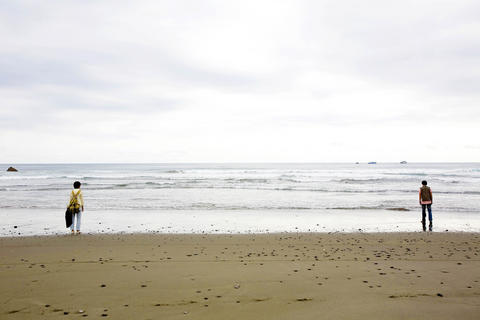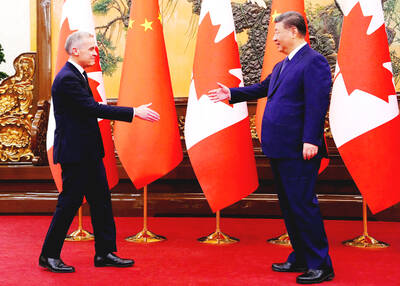Lin Jing-jie's (林靖傑) directorial debut, The Most Distant Course (最遙遠的距離), is one of the most talked-about art-house movies of the year, attracting attention with a high-profile cast led by actress Guey Lun-mei (桂綸鎂) and a story about lone individuals struggling to find their inner selves.
The film follows three emotionally and spiritually crippled Taipei urbanites who are alienated from society.
Psychiatrist A-tsai (Jia Xiao-guo, 賈孝國), who has a talent for piercing the souls of his patients but is unable to cure his own wounds, journeys to Taitung in search of a lost love.

PHOTO: COURTESY OF CHI HSIA FILMS
Young sound recordist Tang (Mo Zi-yi, 莫子儀) is a mess after being dumped by his girlfriend. Hoping to salvage the relationship, Tang circumnavigates Taiwan, recording sounds of the island and sends tape after tape labeled "Sounds of Formosa" to his lover's apartment, now tenanted by Yun (Guey Lun-mei), an office worker suffocated by daily routines and her involvement in a love triangle.
Gradually brought back to life by the simple sounds of the land, Yun sets out on a journey to trace the source of the recordings. The three travelers have different reasons for escaping the capital, but their goal is the same: to find their true selves, which have long been buried and forgotten in the monotony and travails of life.
The script was originally written for director Lin's close friend Chen Ming-tsai (陳明才), an actor who suffered from bipolar disorder and took his own life at Dulan Bay (都蘭灣), Taitung, one year after the screenplay was finished. Nevertheless, hoping to reflect the quest for truth and reality, Lin saw the project through.

PHOTO: COURTESY OF CHI HSIA FILMS
The scene near the end of the film in which the psychiatrist snorkels on the freeway in a diving suit echoes the uncompromising spirit of the late artist who, in the eyes of Lin, refused to become a part of mainstream society and chose to walk a lone path rarely understood by others.
Though the story behind the film sounds depressing, the movie is beautifully shot and interspersed with humor. Mo is decently cast, while Jia delivers a slightly theatrical performance for the role originally written for Chen. Now a regular lead in local productions, Guey exposes her limits as she struggles to express the feelings of the paramour.
Although The Most Distant Course won the best film accolade at the International Critics' Week in Venice and the special jury award at the Taipei Film Festival (台北電影節), the plot is predictable and the story feels a little too familiar. The juxtaposition of gloomy urban landscapes and colorful, soothing scenes of nature is formulaic to the point of being cliche. Despite that, the movie does touch viewers' hearts.

On a harsh winter afternoon last month, 2,000 protesters marched and chanted slogans such as “CCP out” and “Korea for Koreans” in Seoul’s popular Gangnam District. Participants — mostly students — wore caps printed with the Chinese characters for “exterminate communism” (滅共) and held banners reading “Heaven will destroy the Chinese Communist Party” (天滅中共). During the march, Park Jun-young, the leader of the protest organizer “Free University,” a conservative youth movement, who was on a hunger strike, collapsed after delivering a speech in sub-zero temperatures and was later hospitalized. Several protesters shaved their heads at the end of the demonstration. A

Google unveiled an artificial intelligence tool Wednesday that its scientists said would help unravel the mysteries of the human genome — and could one day lead to new treatments for diseases. The deep learning model AlphaGenome was hailed by outside researchers as a “breakthrough” that would let scientists study and even simulate the roots of difficult-to-treat genetic diseases. While the first complete map of the human genome in 2003 “gave us the book of life, reading it remained a challenge,” Pushmeet Kohli, vice president of research at Google DeepMind, told journalists. “We have the text,” he said, which is a sequence of

In August of 1949 American journalist Darrell Berrigan toured occupied Formosa and on Aug. 13 published “Should We Grab Formosa?” in the Saturday Evening Post. Berrigan, cataloguing the numerous horrors of corruption and looting the occupying Republic of China (ROC) was inflicting on the locals, advocated outright annexation of Taiwan by the US. He contended the islanders would welcome that. Berrigan also observed that the islanders were planning another revolt, and wrote of their “island nationalism.” The US position on Taiwan was well known there, and islanders, he said, had told him of US official statements that Taiwan had not

Britain’s Keir Starmer is the latest Western leader to thaw trade ties with China in a shift analysts say is driven by US tariff pressure and unease over US President Donald Trump’s volatile policy playbook. The prime minister’s Beijing visit this week to promote “pragmatic” co-operation comes on the heels of advances from the leaders of Canada, Ireland, France and Finland. Most were making the trip for the first time in years to refresh their partnership with the world’s second-largest economy. “There is a veritable race among European heads of government to meet with (Chinese leader) Xi Jinping (習近平),” said Hosuk Lee-Makiyama, director